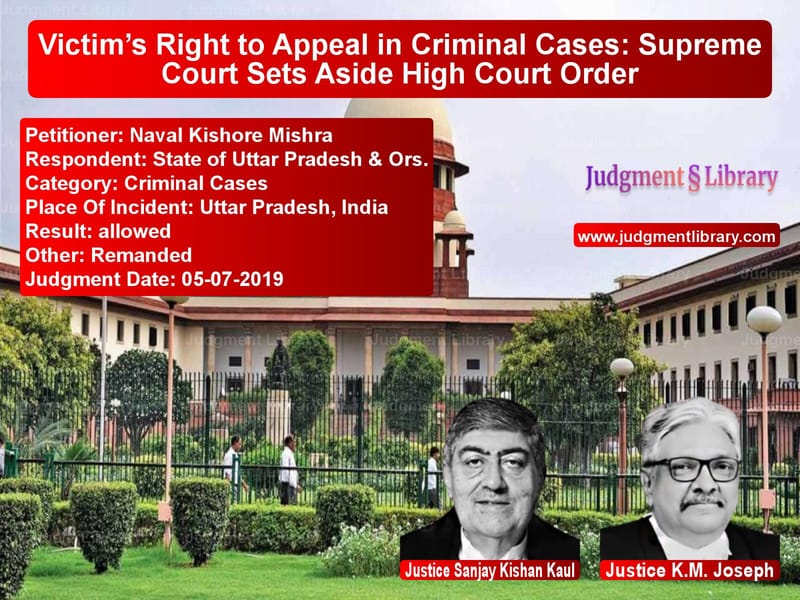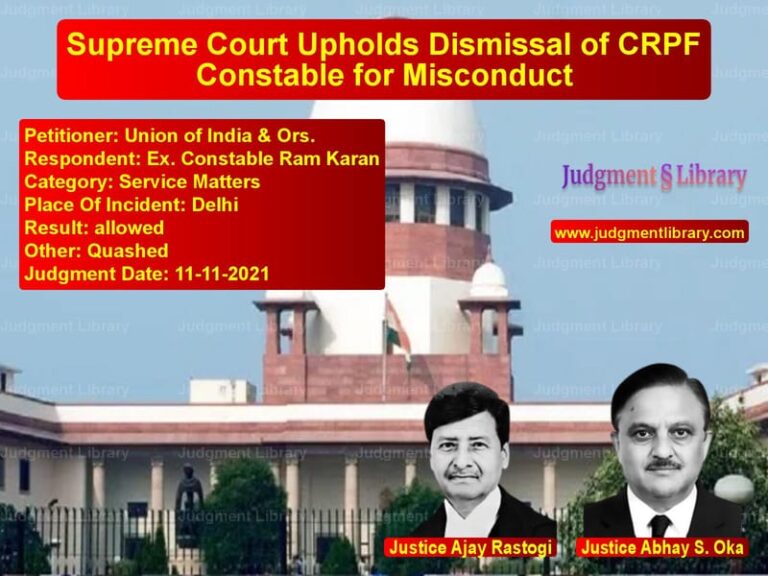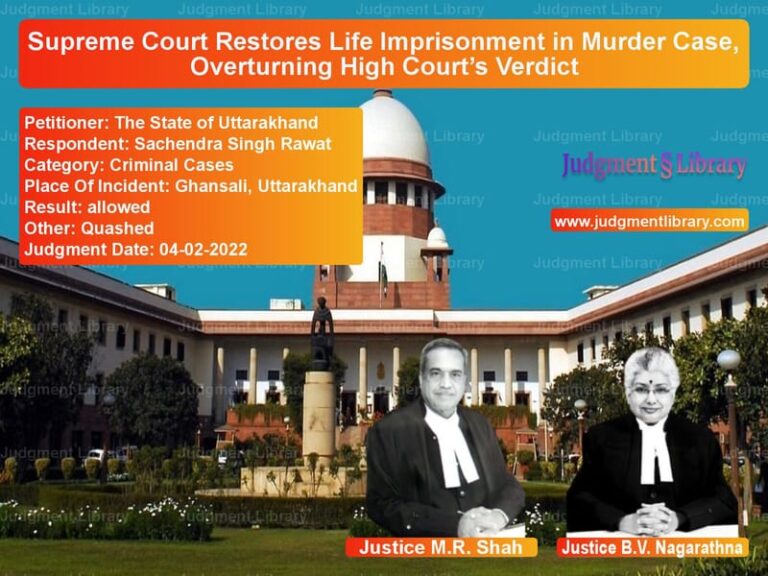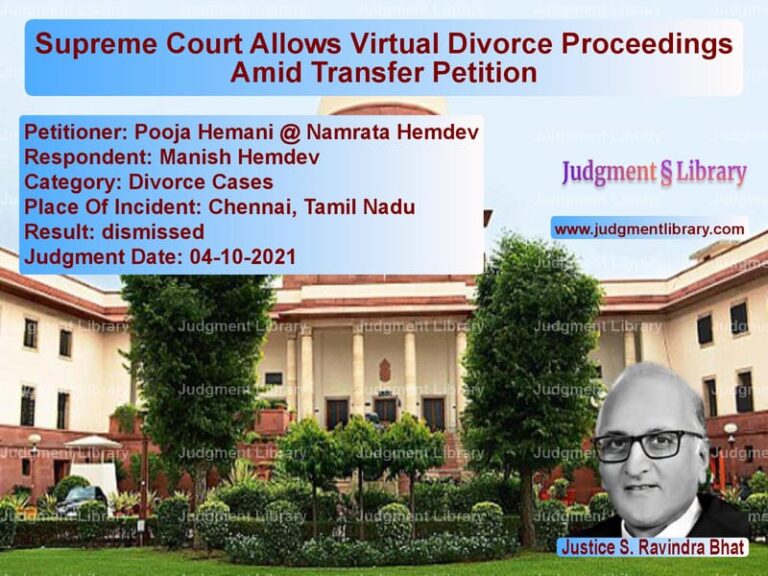Victim’s Right to Appeal in Criminal Cases: Supreme Court Sets Aside High Court Order
The case of Naval Kishore Mishra vs. State of Uttar Pradesh & Ors. is a landmark ruling that reinforces the rights of victims in criminal cases to file appeals against acquittals. The Supreme Court ruled that the High Court erred in dismissing the victim’s appeal on the grounds that the State had not been granted leave to appeal.
The judgment clarifies the scope of Section 372 of the Code of Criminal Procedure, 1973 (CrPC), which grants victims the right to appeal against acquittals, even when the State has not pursued an appeal. The Court cited previous rulings that confirmed victims do not need leave to appeal under this provision.
Background of the Case
The case arose from Sessions Trial No. 80 of 2014, in which the accused were tried under Sections 452 and 302/34 of the Indian Penal Code (IPC). The trial court acquitted the accused on December 19, 2016.
The State of Uttar Pradesh filed for leave to appeal against the acquittal under Section 372 read with Section 378 of CrPC, but the High Court declined leave on April 18, 2017. However, the victim, Naval Kishore Mishra, independently filed an appeal against the acquittal, which was dismissed by the High Court on November 23, 2017.
The High Court reasoned that since the State’s appeal was rejected, the victim’s appeal could not be entertained. This led the victim to approach the Supreme Court.
Petitioner’s Arguments
The appellant, Naval Kishore Mishra, argued that:
- Under the proviso to Section 372 of CrPC, victims have an independent right to appeal against acquittals.
- The rejection of the State’s leave to appeal does not affect the victim’s right to appeal.
- The High Court’s reliance on the State’s failure to obtain leave to dismiss the victim’s appeal was legally incorrect.
- The recent Supreme Court judgment in Mallikarjun Kodagalli (D) through Legal Representatives vs. State of Karnataka & Ors. clarified that victims do not need leave to appeal.
Respondent’s Arguments
The State of Uttar Pradesh supported the victim’s argument, stating that:
- The amendment to CrPC in 2009 granted victims the right to file appeals independently.
- The High Court should have considered the victim’s appeal separately from the State’s appeal.
- The victim in this case was the real brother of the deceased, making him a legitimate legal heir with the right to appeal.
Supreme Court’s Observations
The Supreme Court, in its judgment delivered by Justices Sanjay Kishan Kaul and K.M. Joseph, ruled in favor of the appellant and set aside the High Court’s order.
Victims Have an Independent Right to Appeal
“The legal position enunciated in Mallikarjun Kodagalli (D) through Legal Representatives vs. State of Karnataka & Ors. would show that the appellant had a right to file the appeal and, in fact, no leave has to be sought in such a situation.”
The Court reaffirmed that victims do not need prior leave to appeal against acquittals.
High Court’s Dismissal Was Erroneous
“The only reason recorded for dismissing the appeal of the victim was on the ground that leave had not been granted to the Government to file the appeal. This approach is incorrect in law.”
The Supreme Court found that the High Court’s reasoning was legally flawed.
Final Ruling and Impact
The Supreme Court ruled:
- The victim’s appeal should not have been dismissed on procedural grounds.
- The High Court’s order was set aside.
- The case was remitted to the High Court to be considered on its merits.
Legal Precedents Considered
The Supreme Court relied on key rulings, including:
- Mallikarjun Kodagalli vs. State of Karnataka & Ors. (2019) 2 SCC 752: Held that victims do not need leave to appeal against acquittals.
- Section 372 of the CrPC: Grants victims the right to appeal against orders of acquittal.
Implications of the Judgment
This ruling has significant implications for criminal justice:
- Victims have the right to challenge acquittals even if the State does not file an appeal.
- Courts must evaluate victim appeals on merits and not dismiss them based on procedural grounds.
- Legal heirs of deceased victims can exercise appeal rights under CrPC.
Conclusion
The Supreme Court’s decision in Naval Kishore Mishra vs. State of Uttar Pradesh & Ors. strengthens the rights of victims in criminal trials. By clarifying that victims do not need leave to appeal, the judgment ensures that victims can seek justice independently, even when the State chooses not to pursue an appeal.
Petitioner Name: Naval Kishore Mishra.Respondent Name: State of Uttar Pradesh & Ors..Judgment By: Justice Sanjay Kishan Kaul, Justice K.M. Joseph.Place Of Incident: Uttar Pradesh, India.Judgment Date: 05-07-2019.
Don’t miss out on the full details! Download the complete judgment in PDF format below and gain valuable insights instantly!
Download Judgment: Naval Kishore Mishra vs State of Uttar Prade Supreme Court of India Judgment Dated 05-07-2019.pdf
Direct Downlaod Judgment: Direct downlaod this Judgment
See all petitions in Bail and Anticipatory Bail
See all petitions in Judgment by Sanjay Kishan Kaul
See all petitions in Judgment by K.M. Joseph
See all petitions in allowed
See all petitions in Remanded
See all petitions in supreme court of India judgments July 2019
See all petitions in 2019 judgments
See all posts in Criminal Cases Category
See all allowed petitions in Criminal Cases Category
See all Dismissed petitions in Criminal Cases Category
See all partially allowed petitions in Criminal Cases Category







